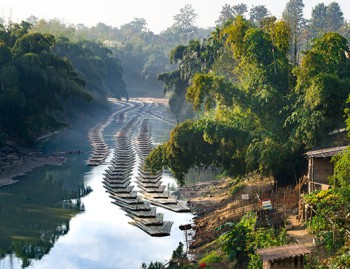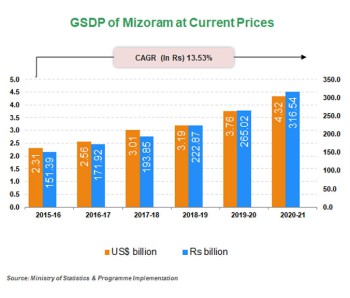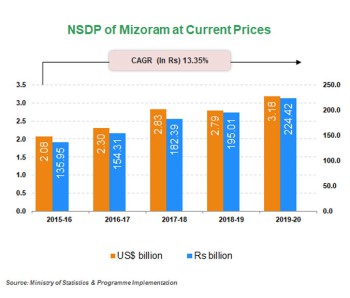INTRODUCTION
Mizoram is one of the seven states in the northeast. Mizoram shares its borders with other northeast states like Manipur, Tripura, and Assam as well as with neighboring countries of Bangladesh and Myanmar.
Industries in the state enjoy a unique location-specific advantage. Bordering Myanmar and Bangladesh, Mizoram offers a gateway for engaging in international trade with Southeast Asian countries. With improving road, rail and air connectivity and the establishment of trade routes with neighboring countries, trade facilitation has improved over the last decade.
Bamboo forests cover 3,267 sq kms of Mizoram’s geographical area. There is an estimated growing stock of 25.26 million metric tonnes (MMT) of 35 varieties of bamboo in the state. It offers immense potential for commercial exploitation of the natural resources for export-oriented industries.
The climatic conditions in the state provide a conducive breeding ground for commercial exploitation of all kinds of silkworms. Sericulture remains one of the state’s key industries. Raw silk production in Mizoram stood at 104 metric tonnes in 2019-20.
Mizoram has the potential to generate 4,500 megawatt (MW) of hydro power. As of April 2021, Mizoram had a total installed power-generation capacity of 207.45 MW, comprising hydro (97.94 MW), thermal (71.51 MW) and renewable energy sources (38.00 MW).
With a literacy rate of 91.33%, Mizoram offers a highly literate workforce. Knowledge of English is an added advantage for the Mizo workforce.
With improving road, rail and air connectivity and the establishment of trade routes with neighboring countries, trade facilitation has improved over the last decade.
According to Department for Promotion of Industry and Internal Trade (DPIIT), cumulative Foreign Direct Investment (FDI) inflow in Mizoram stood at US$ 116 million between April 2000 to March 2019 and US$ 6 million during H1FY20.



KEY SECTORS
- In FY21, the annual allocation in Mizoram to implement the ‘National Bamboo Mission’ stood at Rs. 70 million (US$ 0.95 million).
- Natural resources, climatic conditions, and policy incentives in the state support investment in bamboo, sericulture, tourism, agro-products and agro-processing sectors.
- In 2019, to promote brotherhood among Mizos across the globe, State Government allocated Rs. 1 crore (US$ 0.14 million) to organise unity festivals.
- Total horticulture production in Mizoram was 638.95 thousand metric tonnes as per 3rd advance estimates 2019-20. In FY20, the state produced 344.91 thousand tonnes of fruits under an area of 63.77 thousand hectares. Similarly, 101.49 thousand tonnes of spices were produced in the state under an area of 28.22 thousand hectares in FY20.
- Mizoram has 24,000 hectares of area that can be utilised for fish farming. Only 5,477 hectares out if this were developed as ponds and tanks until 2018-19. The state’s fish production stood at 7,230 MT in 2019.
- With its highly green hills, crisscrossing rivers, and interspersed lakes, Mizoram is a tourist’s paradise. In 2019, foreign tourist arrivals and domestic tourist visits in the state stood at 2,249 and 1,53,762, respectively. In August 2020, the Union Minister of State for Tourism Mr. Prahlad Singh Patel inaugurated the ‘Thenzawl Golf Resort’ project in Mizoram under the Swadesh Darshan Scheme.